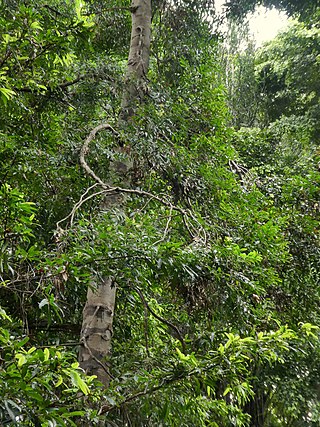
Agathis robusta, the Queensland kauri (pine) or smooth-barked kauri, is a coniferous tree in the family Araucariaceae. It has a disjunct distribution, occurring in Papua New Guinea and Queensland, Australia. Populations in Papua New Guinea may be treated as the distinct species Agathis spathulata.

Hose's palm civet, also known as Hose's civet, is a viverrid species endemic to the island of Borneo. It is listed on the IUCN Red List as Vulnerable because of an ongoing population decline, estimated to be more than 30% over the last three generations and suspected to be more than 30% in the next three generations due to declines in population inferred from habitat destruction and degradation.

Agathis macrophylla known as Pacific kauri, is a coniferous tree native to the islands of the southwestern Pacific Ocean in tropical humid lowlands and lower montane regions, notably in Fiji, Vanuatu, the Santa Cruz Islands, and the Solomon Islands. The Pacific kauri is one of the largest and fastest growing species in its genus, and is important in forestry.

Agathis orbicula is a coniferous tree native to the island of Borneo. It is found scattered throughout tropical rainforests and Kerangas forests. It is commonly found on hills and plateaus. The species is facing a high risk of extinction due to its scattered distribution and the decline in quality of its habitat.

Agathis atropurpurea, commonly known as the blue kauri, and occasionally as the black kauri or purple kauri, is a species of conifer in the very ancient plant family Araucariaceae. The family was distributed almost worldwide during the Jurassic and Cretaceous periods, but is now mostly confined to the Southern hemisphere. This species is endemic to a small part of northeastern Queensland, Australia.

Agathis kinabaluensis is a tree of Borneo in the conifer family Araucariaceae. The specific epithet kinabaluensis is from the Latin, referring to the species being native to Mount Kinabalu in Sabah.

Agathis moorei is a species of tree, endemic to New Caledonia. It occurs scattered throughout the main island in subtropical rainforest at altitudes of 250 metres (800 ft) to 1,000 m (3,300 ft). It is threatened by habitat loss.
Alangium circulare is a tree in the dogwood family Cornaceae. The specific epithet circulare is from the Latin meaning "circular", referring to shape of the leaves.
Anisophyllea beccariana is a tree of tropical Asia in the family Anisophylleaceae. It is named for the Italian botanist Odoardo Beccari.
Anisophyllea chartacea is a tree of Borneo in the family Anisophylleaceae. The specific epithet chartacea is from the Latin meaning "papery", referring to the leaves.
Anisophyllea ferruginea is a tree of Borneo in the family Anisophylleaceae. The specific epithet ferruginea is from the Latin meaning "rust-coloured", referring to the leaf hairs.
Canarium fuscocalycinum is a tree of Borneo in the incense tree family Burseraceae. The specific epithet fuscocalycinum is from the Latin meaning "dark calyx".
Canarium littorale is a tree found in tropical Asia and is a member of the incense tree family Burseraceae. The specific epithet littorale is from the Latin meaning "of the seashore", referring to its habitat.
Canarium pseudodecumanum is a tree of tropical Asia in the incense tree family Burseraceae. The specific epithet pseudodecumanum is from the Latin meaning "false decumanum", referring to the species' resemblance to Canarium decumanum.
Canarium pseudopimela is a tree of Borneo in the incense tree family Burseraceae. The specific epithet pseudopimela is from the Latin meaning "false pimela", referring to the species' resemblance to Canarium pimela.
Canarium sarawakanum is a tree of Borneo in the incense tree family Burseraceae. The specific epithet sarawakanum is from the Latin, referring to the species being native to Sarawak.
Cassine viburnifolia is a mangrove plant of tropical Asia in the staff vine family Celastraceae. The specific epithet viburnifolia refers to how the plant's leaves resemble those of the genus Viburnum.
Melicope subunifoliolata is a plant of Borneo in the family Rutaceae. The specific epithet subunifoliolata is from the Latin meaning "nearly one leaf", referring to the almost unifoliolate leaves.

Agathis borneensis, also known as Borneo kauri, is a species of conifer in the family Araucariaceae.
Madhuca motleyana is a tree in the family Sapotaceae. It is named for engineer and naturalist James Motley, who lived and worked in Borneo in the 1850s.








